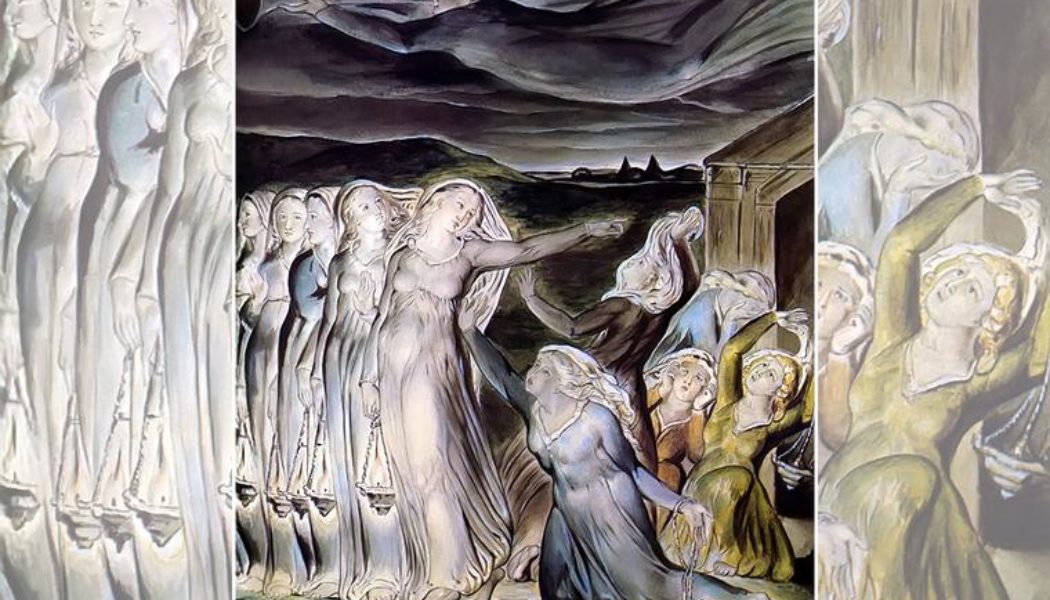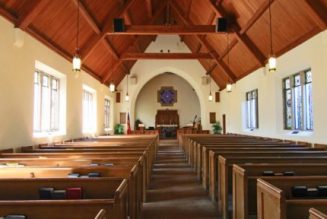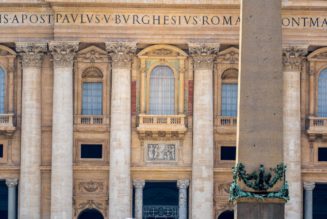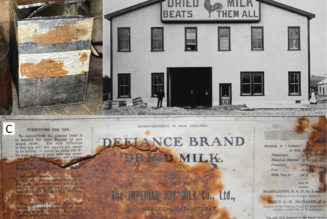
Counting today, three Sundays remain in the current liturgical year. As the Church enters the final weeks of Ordinary Time, the focus of its readings shifts to the eschatological — death, judgment, heaven, hell — and our readiness for them. That transition also coincides with the Church’s focus during the month of November on prayer for the faithful departed, particularly the souls in Purgatory.
Today’s Gospel is the Parable of the Wise and Foolish Virgins. The ten virgins form a bridal party, waiting for the arrival of the bridegroom for the wedding celebration to begin. He is delayed, and they begin to doze off. “At midnight, there was a cry: ‘Behold, the bridegroom! Come out and meet him!’”
As the ladies-in-waiting scramble to respond, they discover that their lamps have used up more oil than they expected. Five anticipated that contingency. They brought extra oil and were ready to meet the bridegroom. Five did not, and try to borrow oil from their farsighted and prudent sisters. They — because they are farsighted and prudent — reckon that giving away some of their oil may lead to everybody being in the dark (it is midnight), so they decline. Instead, they counsel their shortsighted sisters to “go instead to the merchants and buy some for yourselves.”
Now I can say, based on the year that I lived in Taiwan, there’s a 7-Eleven on virtually every corner in the city where you could conduct almost any kind of business day or night. But first-century Israel is not 21st- century Taiwan, and Jesus did not live in a world of round-the-clock consumerism. Elsewhere in the Gospels, Jesus speaks about a householder who unexpected guests in the middle of the night and doesn’t have a crust of bread to feed them. Knocking on his neighbor’s door, he may get the pushback, “The door is now shut, and my children and I are in bed. I can’t get up and give it to you!” (Luke 11:5-8). Jesus assures his listeners that the sleepy neighbor may give in, not out of friendship but persistence. Maybe the same might be true of the oil merchants?
The problem is, while those five are out looking for oil, “the bridegroom came and those who were ready went into the wedding feast with him. Then the door was locked.”
Christianity is a faith firmly rooted in time. “In the fifteenth year of the reign of Tiberius Caesar, when Pontius Pilate was governor of Judea, Herod tetrarch of Galilee, his brother Philip tetrarch of the region of Iturea and Trachonitis and Lysanias tetrarch of Abilene, during the high priesthood of Annas and Caiaphas …” John the Baptist received the word of God (Luke 3:1-2). So profound is Christianity rooted in time and time affected by Christianity, we have even traditionally divided history into B.C. and A.D.
Which is to say that the decisions of our lives — including our spiritual lives — occur in time and history.
Bernard Häring pointed out that the Greeks had two words for time: chronos and kairos. Chronos was the time we measure, chronological time: five minutes ago, two hours from now, midnight.
Kairos is the moment of opportunity or, from a Christian perspective, the moment of grace. Grace is God’s gift. By definition, it is not an entitlement but given freely. So, when it is given, seize it, because grace — like opportunity — need not knock twice. That’s why the Bible counsels us: “If today you hear his voice, harden not your hearts …” (Psalm 95:7-8; Hebrews 3:15, emphasis added).
In the 1988 film adaptation of Karol Wojtyła’s “Jeweler’s Shop,” Father Adam speaks about the Parable of the Ten Virgins from the viewpoint of kairos: “As for the foolish virgins who chose not to be prepared, the door to the wedding banquet is shut. They missed their chance and their love.”
Later, when the young Chris wants to marry Monika, she puts him off and he waits … for a while. But, when he proposes again, he adds: “I’ve given you time. That proves that I care. … Time’s up.”
Love, which we experience now in time, demands readiness and decision. Love, like opportunity, may not knock twice.
Last month, we heard the parable of the king who prepares a wedding banquet for his son, but the invited guests don’t come. So, he sends his guards to gather people from the highways and byways, one of whom is an unprepared guest, lacking the wedding garment.
When the wedding banquet starts, you need to have your wedding garment, and your light needs to be burning bright.
In the Bible, we are warned, “It is now time for you to wake from your sleep, because your salvation is nearer now …” (Romans 13:11-12). That’s a theme that will be repeated over the next few weeks and into the first weeks of Advent. The Christian is exhorted not to sleep but to vigilance, to readiness … now.
After all, this is what Christianity is moving toward. All the action of salvation history is directed to one end: the triumph of God and good, the restoration of all things in Christ. This is the one article of the Profession of Faith we declare every Sunday still in the future tense. Our position is not ambiguous: “I look forward to the resurrection of the dead and the life of the world to come.”
Do we look forward, like the Wise Virgins, having prepared for that day? Or do we “look forward,” like the Foolish Virgins, whose lamps are going out?
Today’s Gospel is illustrated in pen and watercolor by the British artist William Blake (1757-1827), a “pre-Romantic” or Romantic poet and painter. Blake’s religious views were anything but orthodox: in some ways, he was “New Age” before New Age arrived. Most of his recognition and reputation came posthumously.
Blake’s pen-and-watercolor “Wise and Foolish Virgins” is a theme he seems to have returned to several times. The curvature of the figures makes the scene very dynamic. The five Wise Virgins, on the left, their lights shining, are ready: they stand in rank, their faces calm, ready to go to the wedding feast. None but one of the five Foolish Virgins, on the right, has even stood up. They are uncoordinated, their lamps out. The lamps drag on the ground, their faces are distraught.
Two reach out in seeming entreaty to the Wise Virgins, while one of the latter points them away to the oil sellers. Indeed, her gesture of what the Foolish Virgins need to do almost seems to have a double purpose: it separates the Wise from the Foolish, dividing the prepared and the unprepared. The Foolish Virgin, in brown, seems almost repulsed by that gesture. Another of the Foolish Virgins (in blue) is already weeping (gnashing of teeth to follow?) Commentators note that the Wise Virgins are almost translucent and airy, while the Foolish Virgins are in solid colors and seemingly weighed down.
Matthew’s “cry” of the Bridegroom’s impending arrival in Blake becomes an angel with a trumpet hovering over the Virgins, alluding to the eschatological trumpet call of the Last Day. One wonders the degree to which 1 Thessalonians (which is today’s Second Reading) colored Blake’s imagination:
For the Lord himself, with a word of command, with the voice of an archangel and with the trumpet of God, will come down from heaven, and the dead in Christ will rise first.
Then we who are alive, who are left, will be caught up together with them in the clouds to meet the Lord in the air (1 Thessalonians 4: 16-17).
We clearly have a trumpeting angel, and the sinuous forms of the already seemingly transfigured Wise Virgins on their feet, looking ready to float up. Their Foolish sisters, in contrast, have not arisen. They seem to be weighed down and earth-bound. Indeed, the first Foolish Virgin, in blue in the foreground, reaching up to the rightmost Wise Virgin, looks almost to be dragging herself out of a grave, grasping for help. She seems as much in need of a lift as a light. A little note: the shadow on the ground between those two seems as much a chasm dividing their respective fates as the natural play of light and dark.
While Matthew speaks of the Bridegroom’s “midnight” arrival, the light seems to be breaking over the hill and on the horizon. Is that another allusion to Paul’s counsel about vigilance?
And do this because you know the time; it is the hour now for you to awake from sleep. For our salvation is nearer now than when we first believed; the night is advanced, the day is at hand. Let us then throw off the works of darkness [and] put on the armor of light (Romans 13:11-12).
Is day approaching, the day of salvation for which one should have been vigilant? It is time to get up and “put on the armor of light.” The Wise Virgins, with their lamps, have.
(Blake may not have been an orthodox Christian but, as a Protestant, he would have been steeped in his Bible).
The moment is at hand. Are you ready to seize it?




![TikTok is making sea shanties big again [note: skip the first video and jump down to the various ‘Wellerman’ mixes]…](https://salvationprosperity.net/wp-content/uploads/2021/01/tiktok-is-making-sea-shanties-big-again-note-skip-the-first-video-and-jump-down-to-the-various-wellerman-mixes-327x219.jpg)



